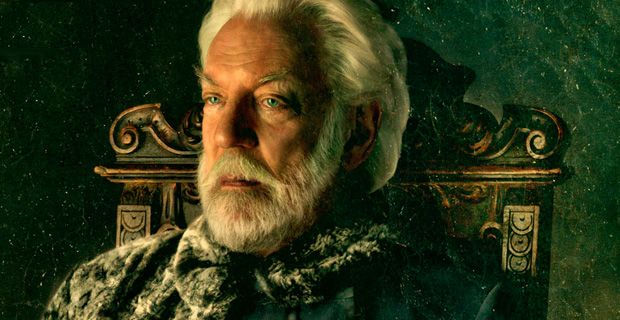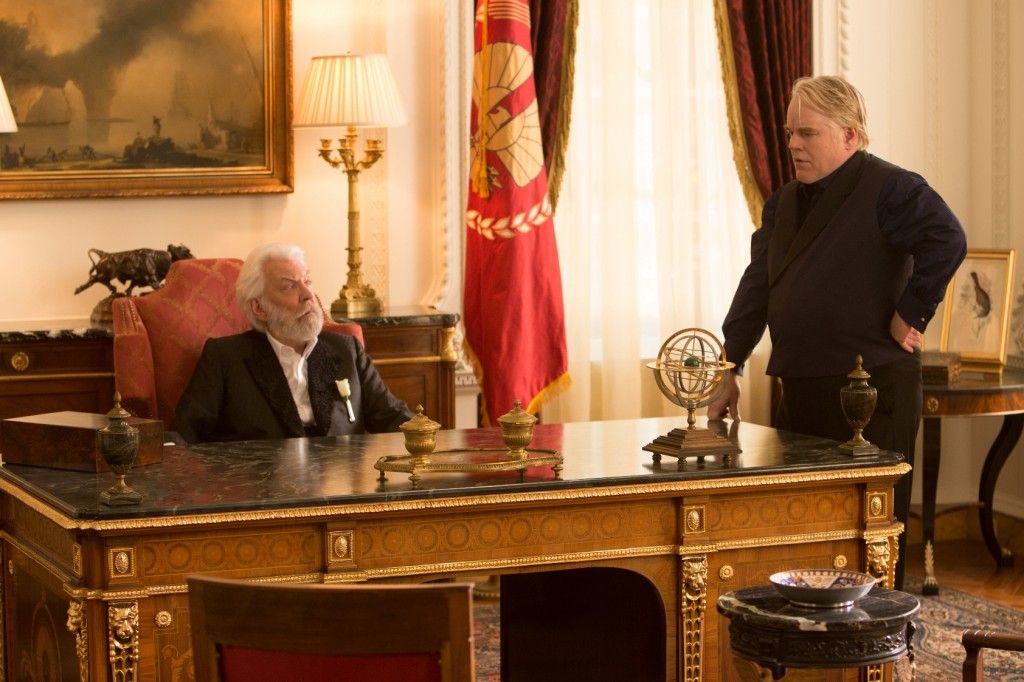In The Hunger Games series, President Coriolanus Snow (Donald Sutherland) is the leader of the nation Panem and resides in the Capitol, ruling over the Districts and pulling tributes from them for the annual Hunger Games event. He's powerful, intimidating, overly controlling and he serves as the ruling antagonist.
In the sequel Catching Fire, moviegoers will see the Snow begin to lose that sense of control when Katniss and co. continue to thwart his plans to maintain ultimate power over Panem. Always paranoid of rebellion, Sutherland gets plenty of screen time in The Hunger Games sequel to showcase a wide range of emotions as a tyrant losing his grip.
Don Kaye had the opportunity to sit down with Donald Sutherland on behalf of Screen Rant to talk about President Snow, why the actor doesn't consider him a "villain," the politics of The Hunger Games, and why Jennifer Lawrence is someone to look out for.
-
Someone asked you how you felt about President Snow in this film and you said you love him. Is that the key for you in playing a villain, that you have to embrace that guy so you can fully inhabit and understand him?
Donald Sutherland: I don't ever think of anybody as being a villain. I think of him as he's a tyrant. When I wrote the letter to Gary (Ross) initially to see if I could play this, I brought out images of Lenin and Stalin. I even brought up an image of Bashar al-Assad in the whole list of them. I said I don't know actually how Assad fits in, but this was four years ago -- he fits in perfectly now. But these are people who have found a way to exert power by extraordinary force and manipulation. We do it too in the United States, you know. A guy as good as Barack Obama sends predator drones over Pakistan and you have collateral damage, Jesus Christ, collateral damage. A dead kid in your arms and that's collateral damage? I'm sure I don't think it's collateral to the people on the ground.
His mouth bleeds. He wears a rose 'cause his mouth smells of blood and that's because he's ambitious. 40 years ago, he poisoned all his competitors for this job. So that he would be not accused of being the person that did the poisoning, he took some poison himself. Not enough to kill him, but enough so that it was in his bloodstream so that he was a survivor. He was able to control the country when part of it broke away. And he uses an iron hand. He executes people as his way of controlling the population. But he does it so well. And he doesn't think he's a bad person. He thinks it's the only way that society can survive. And whether you think he's right or wrong, he doesn't think he's bad. He likes himself.
[gallery columns="2" ids="393307,393306"]
You've got those great scenes where you're very almost congenial to Jennifer Lawrence in a sense, and then we actually see scenes of Snow with his granddaughter. Does that make him more rounded as a human being, even if he's a human being who's gone entirely off the rails?
Sure he is, within a certain context. Absolutely he is. And he must be a lovely fellow to be with so long as -- you know. When he spoke to Seneca Crane in the rose garden scenes that Gary wrote for the first movie, he was able to create a scene where Snow was so articulate with Crane because he was grooming Crane to be his successor and Crane blew it. He was sentimental. He made wrong decisions. You can't make wrong decisions because they cost you your life. For Snow, Katniss Everdeen is perfect. She's everything he desires as a successor. And maybe he will succeed and turn her around, 'cause she doesn't want to be a hero of the revolution. Other people are doing that to her. He's doing a different thing on his side. He's using the thing he knows, which are threats and manipulation. But nonetheless, it's a game of chess and it's not going to come to a draw. Somebody's king is going to topple over.
Do you feel that films can affect political thinking in people? You've lived through several turbulent periods of this country's history, where films did speak to people that way. Do you see that still capable of happening today with movies like The Hunger Games?
That's why I asked if I could be in it because I felt that it could be. I felt that it could be another Battle of Algiers. When I was 18 I went to the movies in the afternoon in Toronto. There was a cinema called the Loew's Uptown on Yonge Street, which had two cinemas really side-by-side. This would have been 1955, I guess -- maybe '56, '55 probably. And I went to the movies all alone and I just sat there. There was a movie by an Italian fellow called La Strada and it was so beautiful. I came out and I wanted to go to another movie so I went to the theater next door. I didn't even look at the marquee to see what it was. I sat down and it was Kubrick's Paths of Glory, and it changed my life. It changed my life. All the desperate things that were in my soul and my mind and my heart coalesced and became one thing. I came out of that cinema and I picked up stones from the street and threw them on the ground, I was so angry. It doesn't go a long way but it generates a political ambition. I mean I was an actor; I was not a politician or a journalist or someone who had any weight. But yes, I think films can do that, and I hope this will.
Is the movie's message open to interpretation depending on your point of view? Could someone from the Tea Party sit down and look at this and think of President Snow as, say, President Obama?
No chance -- Oh, I see what you're saying. Well, the Tea Party doesn't look at Barack Obama as a dictator; they look at Barack Obama as a black man in the White House. That's what they look at. That's what generates their hatred, you know. They're saying "dictator" only because they can't say what they really think. But it's so hard for me because I can't get myself into that mindset. You know, Ted Cruz is a smart fellow. Joe McCarthy, Senator McCarthy was a smart fellow. They almost look alike. But I don't understand why people would go into government unless it's for profit or for money, if they're not interested in actually participating in a government that helps people.
What do you see in the younger actors and directors you're working with today that they either have in common with people you've worked with in the past, or are different from people you've worked with in the past?
I don't see much of them actually, to be truthful. But Jennifer, she's a genius. She's a delivery system for the truth. She channels characters and you can see how innocent she is really and how she takes information and absorbs it. She doesn't manipulate it. She doesn't calculate it. She doesn't design it. It just happens. I mean it's deliberate and it's truthful and it's recognized as such. That's why everybody goes "Oh wow," because she's delivering the truth. She said today, "Making a movie is better than going on a vacation," and then she added just to be funny, "so long as the catering's good." She has that kind of wit.
But the truth of it is that making a movie is better than going on a vacation because she's liberated from whatever it is about her own life and is in this realm of beauty and exquisiteness and epiphanies. My admiration for her is unbound, I have to be truthful. I'm in her thrall. I just love her. To look across the table at her and threaten her life and watch her eyes, it's so delicious.
-
Read our interview with Elizabeth Banks about Effie Trinket for more and check this fun video about joining a District.
Catching Fire is directed by Francis Lawrence and stars Jennifer Lawrence, Josh Hutcherson, Liam Hemsworth, Philip Seymour Hoffman, Woody Harrelson, Elizabeth Banks, Willow Shields, Stanley Tucci, Lenny Kravitz and of course, Donald Sutherland.
What are your thoughts on Coriolanus Snow and Sutherland's portrayal of him?
The Hunger Games: Catching Fire opens in theaters on November 22, 2013.


